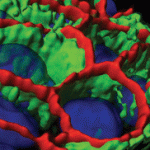With half of our faculty members dedicated to scientific and clinical research, the Department of Ophthalmology and Visual Sciences never falls short of new discoveries to report on. Our researchers cover a wide range of eye care areas, ranging from basic research to cellular and molecular immunology.

Nanoparticles subdue antibiotic-resistant bacteria’s defences while enhancing innate immunity
A method for overcoming antibiotic resistance uses multimodal nanoparticles that target bacterial defence mechanisms while enhancing the innate immune response. The rise in antibiotic resistance is considered a slow-moving medical catastrophe, as these revolutionary drugs that have kept us relatively safe from bacterial infection for decades are losing their efficacy. In part due to their co-evolution, bacterial pathogens have developed mechanisms to resist almost every antibiotic on the market and we are in desperate need for new, innovative approaches. Writing in Nature Nanotechnology, Zhu et al. present a nanoparticle-based possibility, in which they target bacterial defence mechanisms while simultaneously enhancing the ability of the host immune cells to fight infection.
April 17, 2024
Introducing the 2024 Kambara Symposium Keynote Speaker: Budd Tucker, PhD
A highly accomplished vision scientist and expert in retinal disease will be the keynote speaker at the 2023 George Kambara, MD Vision Science Symposium on Friday, April 14, 2024.
April 3, 2024
New Vision Research Utilizes “Cell” Sequencing to Shed Light on Childhood Glaucoma
Stuart Tompson, PhD and colleagues at the University of Wisconsin—Madison are exploring a novel cell profiling approach to understand Primary Congenital Glaucoma (PCG). PCG is a severe pediatric eye disease affecting 1 in 10,000 infants …
March 11, 2024
Testing Senses and Motor Skills in Midlife May Help Predict Later Cognitive Impairment
When researchers test motor skills, hearing, vision, and smell in people in their midlife, they are better able to identify those who may develop cognitive decline or impairment 10 years later, according to a new …
February 28, 2024
Novel Research from UW Vision Scientists Could Offer Hope for the Early Detection of Alzheimer’s Disease
Novel research from scientists in UW-Madison’s Department of Ophthalmology and Visual Sciences may lead to a new, non-invasive method for the early detection of Alzheimer's Disease.
February 5, 2024
Knowing What Dogs Like to Watch Could Help Veterinarians Assess Their Vision
Researchers at the University of Wisconsin–Madison have taken a novel approach to assessing canine vision. Their recent study uses a dog’s interest in a variety of video content to better measure the quality of its vision.
January 23, 2024
New Research Reveals Signs of Glaucoma May Be Detectable Years in Advance of Disease Onset
Groundbreaking research from Yao Liu, MD and colleagues reported that low pigment density in a part of the light-sensing retina called the macula may serve as an early warning sign of glaucoma – suggesting a strategy for the testing and treatment of the disease.
December 4, 2023
Vision Research Core Receives $3.1 Million Grant
The Vision Research Core has received a $3.1 million grant from the National Eye Institute to provide expertise, facilities, and equipment to foster and expand vision research across the University of Wisconsin-Madison campus.
November 6, 2023
Big Data, Big Results: UW Selected as Member of IRIS Registry Analytics Consortium
The department is now a member of the American Academy of Ophthalmology’s Intelligent Research in Sight (IRIS) Registry Analytics Consortium. This will allow the access to big data that has the potential to shape future scientific research.
September 5, 2023
Dr. Julie Mares retires after 32 years of research and service
Mares, a professor in the Department of Ophthalmology and Visual Sciences, retired from UW-Madison on July 14th after a lengthy career exploring the connections between food, a healthy lifestyle, genetics, and nutrition in preserving eye health.
August 10, 2023
UW Researchers Will Develop Gene Editing Therapy to Treat Blindness
A new study by UW researchers will test gene editing therapy to treat blindness. The collaborative project involves a team of ophthalmology researchers and biomedical engineers.
June 8, 2023
Introducing the 2023 Kambara Symposium Keynote Speaker: Shiming Chen
A highly accomplished vision scientist and expert in retinal disease will be the keynote speaker at the 2023 George Kambara, MD Vision Science Symposium on Friday, April 14.
March 3, 2023
New Nanoparticles Deliver Therapy Brain-Wide, Edit Alzheimer’s Gene In Mice
Researchers at UW–Madison have engineered silicone nanoparticles to cross the blood-brain barrier in mice to deliver brain-wide gene editing therapy for Alzheimer’s disease.
January 20, 2023
Lab-Grown Retinal Eye Cells Open Door For Clinical Trials to Treat Blindness
Retinal cells grown from stem cells can reach out and connect with neighbors, according to a new study, completing a “handshake” that may show the cells are ready for trials in humans with degenerative eye disorders.
January 5, 2023
UW Researcher Receives Grant to Expand Knowledge of Molecules Regulating Retinal Function
Mrinalini Hoon, PhD, has been granted a $150,000 Research to Prevent Blindness (RPB) Career Advancement Award.
December 19, 2022- More Research News posts